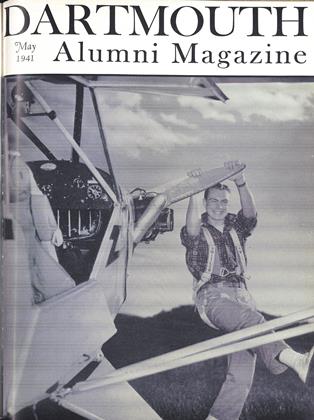It was a year ago that the war clouds broke their torrents over the world. It came so suddenly that undergraduate attitudes stiffened understandably into confusion and resentment, with much clinging to false hopes and the illusions they had learned from their elders about peace and good will in the world. It has been a time of bitter awakening for students and their elders. There is no martial music in the air—the determination of the entire college community to do its part, individually and collectively, is marked by a lack of outward enthusiasm. One feels it is a spirit all the more thoughtful and forceful and determined, and thereby dangerous to the foes of the freedom that is cherished by the liberal college and the nation, and that is worth fighting for.
Mr. Bolte has traced this change of attitude among students in his candid and thoughtful editorship of the Undergraduate Chair.
Almost a year ago we wrote in these columns of the old hill-country saying: "you have to take the bitter to enjoy the sweet." We said that President Hopkins in his Baccalaureate address last June had spoken to the seniors in prophetic fashion when he called emphatically upon them to "stand on their feet" and be prepared to endure discipline and hardship. We wrote that "the bitter in the world today overpowersand crushes the sweet. It will not pass soon.This will be a long March mud season oflowering clouds, storms, despairing hopes.Spring will be very late coming."
Last month in Hanover there was early sunshine on campus grass, which was greener in April than for many a year. The new coaching staff and football squad moved outdoors when the spring vacation ended April B—unprecedented. (Tuss McLaughry can't be made to realize, we fear, how lucky he was with the early spring, even though everyone told him how lucky he was, several times a day.)
BUT HEADLINES IN THE PAPERS, news broadcasts, and finally action by the College Defense Committee in collaboration with the editors of The Dartmouth showed—if proof was needed—that the mud is really deeper this spring, that the "lowering clouds, storms, despairing hopes" make the true spring that men's hearts yearn for seem very far away.
Alumni will be interested in reading the letter addressed to the chairmen of faculty departments and to the student body from the central committee of American Defense Dartmouth Group, which is reprinted in full in this issue of the ALUMNI MAGAZINE.
When we ask: "What will happen to the College in the war?" there is no answer. We can say that we are confident Dartmouth as a liberal arts college abreast of the times, and eager to meet its obligation to the public welfare, can contribute valuably to its students in the immediate emergency, and can do much for its students over the long pull in the next few years. The answer can be given that we hope the College can "stick to its last"—to provide instruction vital to students in the crisis they face, and give education equally vital to them in the life of later years.
We can all wish, and we do, that when the vacations end—in September, January, next April—there will be full rows of lighted dormitory windows in what are otherwise dark and somber, lifeless, buildings.
 View Full Issue
View Full Issue
More From This Issue
-
 Article
ArticleIdeals of Work-Service in Vermont
May 1941 By CRAIG KUHN '42 -
 Class Notes
Class Notes1921
May 1941 By CHARLES A. STICKNEY JR., ORTON H. HICKS -
 Article
ArticleWhat of the Senior Fellows?
May 1941 By THEODORE WACHS JR. '41 -
 Article
ArticleThe Undergraduate Chair
May 1941 By CHARLES BOLTE '41 -
 Article
ArticleCourse Elections Stressed
May 1941 -
 Article
ArticleOdyssey of Songsters
May 1941 By James H. Rendall Jr '42
The Editor
-
 Article
ArticleOut-Door Dartmouth
October 1935 By The Editor -
 Article
ArticleDon't Beat Yale!
October 1935 By The Editor -
 Article
ArticleThe Changing Season
December 1935 By The Editor -
 Article
ArticleCurrent Investigations
December 1935 By The Editor -
 Article
ArticleSuch Is Life!
December 1935 By The Editor -
 Article
ArticleSentiment and Reason
April 1940 By The Editor








